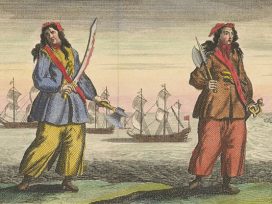Legislation allowing the Olympic organisers to control the “association” of the games with approved products – required by the IOC as a condition of a successful bid – disadvantages the community stakeholders of major sporting events, argues Teresa Scassa.
Articles
Read more than 6000 articles in 35 languages from over 90 cultural journals and associates.
The downside of open access
Why information philanthropy is bad for the South
The impact of open access publishing models on the developing world is uncertain, writes Jorge L. Contreras. Until “information philanthropy” is supplanted by self-sufficient, south-focused open-access journals, the potential of developing world scientists will not be fully realised.
Law, politics and history in international relations
Macedonia and Greece
At the moment of the Macedonian nation’s greatest victory, independence, “the name issue became the new symbol of our defeat”, regrets Denko Maleski. Predictably enough, those in Macedonia to benefit were the nationalist Right, thus confirming Greek fears.

Porous cities
On four European ports
Walter Benjamin’s description of Naples as a “porous city” absorbent of heterogeneity applies equally to other harbour cities, write Jude Bloomfield and Franco Bianchini. On cultural hybridity, economies of informality and strategies of creativity in four European ports.

Piratical transgressions, political transgressions
Re-reading Carl Schmitt's "Theory of the partisan"
Recent historiography emphasizing the egalitarian-democratic character of eighteenth-century piracy undermines Carl Schmitt’s quasi-legal distinction between the partisan and the pirate and reinstates the pirate as political actor within the emergent maritime state order, argues Dominique Weber.

The simple Gothenburger
Colonial elisions in the Swedish self-image
The re-launch of a reconstructed eighteenth-century merchant ship was supposed to promote Sweden’s image as reliable trading partner with an immaculate past. But the failure throughout the project to acknowledge the colonial involvements of the ship’s former owner suggests a less complimentary story, writes Mikela Lundahl.

Traces of ignominy
Gothenburg's French block and Sweden's hunt for colonies
Gothenburg’s Franska tomten neighbourhood takes its name from a French warehouse established in the eighteenth-century through a colonial trade-off between the French and Swedish crowns. Today, the name’s origins are largely forgotten, writes Klas Rönnbäck.

London’s relationship to water and to the sea remains central to its role in the global economy and vital to a gamble in which the Olympics is a part, argues Anthony Iles. On the connections between shipping, logistics and the hi-speed, only apparently immaterial world of finance.
The Leveson Enquiry into the UK hacking scandal is drawing to a close, yet the future of a new press regulatory body remains controversial. Enda O’Doherty asks what the enquiry’s findings mean for a definition of journalistic standards and the proper relation between politics and media.
Nowhere is the politics of history more vexed than in the conflict over the use of the name “Macedonia”. Valentina Mironska-Hristovska presents the Macedonian position, arguing that the Greek claim to the historical-cultural legacy of Macedonia is, at heart, paradoxical.
Sports journalist and historian Mihir Bose measures the lip service paid to civil rights by sports officials over the last 150 years against actions taken. Of all sporting associations, it is the rhetoric of the IOC that bears the least relation to reality, he writes.
The charge of the pink brigade
FEMEN and the campaign for gender justice in Ukraine
Is FEMEN the precursor of a bold new protest pattern, asks Marian Rubchak, or has it been reduced to an organization of exhibitionists? As long as gender injustices multiply in Ukraine, the strength of FEMEN’s message remains undiminished: for the present, semi-nudity could be the most viable means of generating public dialogue on women’s rights.
Because Evangelicals still treat Mormons with deep suspicion, Mitt Romney has been deploying the language of “common ground” in his attempt to unite the Republican vote, writes Abby Ohlheiser. Alongside opposition to same-sex marriage, common ground includes a religious persecution complex.
Maggification - a personal reading
The historiography of Margaret Thatcher's theatre of politics
Margaret Thatcher’s creation of her own “spectacle of perfection” has not gone unchallenged in subsequent biographies. Anneke Ribberink looks at the varying degrees of sympathy with which historians and journalists have portrayed aspects of Thatcher’s political persona.
Show the poor!
Returning to the art of the Great Depression
When Roosevelt insisted that photographers and writers document the Great Depression, they produced lasting, iconic work that allowed America to doubt its myths but also to get back on track. So where, asks Alice Béja, are today’s Dorothea Langes and John Steinbecks?

Paralysed by predictable stand-offs between developing nations and the West, the Rio+20 Earth Summit failed to produce anything but vague commitments. Faced with the impossibility of consensus, governments and corporations opted for a go-it-alone approach. Reporting from Rio, Claudia Ciobanu discerns opportunities nonetheless.